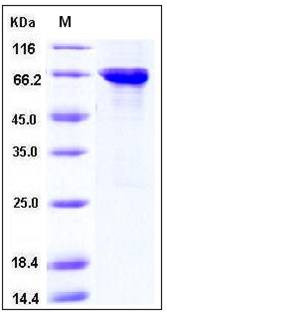Human MST4 Protein (GST Tag)
MASK,MST4
- 100ug (NPP4095) Please inquiry
| Catalog Number | P10667-H09B |
|---|---|
| Organism Species | Human |
| Host | Baculovirus-Insect Cells |
| Synonyms | MASK,MST4 |
| Molecular Weight | The recombinant human MST41/GST chimera consists of 641 amino acids and predicts a molecular mass of 73 kDa. It migrates as an approximately 65 kDa band in SDS-PAGE under reducing conditions. |
| predicted N | Met |
| SDS-PAGE |  |
| Purity | > 95 % as determined by SDS-PAGE |
| Protein Construction | A DNA sequence encoding the human MST4 isoform 1 (NP_057626.2) (Met 1-Pro 416) was expressed with the fused GST tag at N-terminus. |
| Bio-activity | The specific activity was determined to be 15 nmol/min/mg using MBP as substrate. |
| Research Area | Immunology |Signal Transduction |Protein Phosphorylation |Tyrosine Kinase |Other in Tyrosine Kinasse |
| Formulation | Supplied as sterile 50mM Tris, 100mM NaCl, pH 8.0, 25% glycerol, 0.6mM GSH, 0.5mM PMSF, 0.5mM EDTA, 2mM DTT 1. Normally 5 % - 8 % trehalose, mannitol and 0.01% Tween80 are added as protectants before lyophilization. Specific concentrations are included in the hardcopy of COA. |
| Background | MST4, also known as mammalian STE20-like protein kinase 4, is a novel member of the germinal center kinase subfamily of human Ste20-like kinases and is closely related to MST3. The 416 amino acid full-length MST4 contains a C-terminal regulatory domain and an N-terminal kinase domain, both of which are required for full activation of the kinase. MST4 is highly expressed in placenta, thymus, and peripheral blood leukocytes. MST4 specifically activates ERK but not JNK or p38 MAPK in transient transfected cells or in stable cell lines, and thus is biologically active in the activation of MEK/ERK pathway mediating cell growth and transformation. Further, MST4 kinase activity is stimulated significantly by epidermal growth factor receptor (EGFR) ligands, which are known to promote growth of certain cancer cells. Accordingly, MST4 have a potential role in signal transduction pathways involved in cancer progression. Three alternatively spliced isoform of MST4 have been isolated, and isoform 3 lacks an exon encoding kinase domain and may function as a dominant-negative regulator of the MST4 kinase. |
| Reference | 1. Qian, Z. et al., 2001, J Biol Chem. 276 :22439-45. 2. Lin, JL. et al., 2001, Oncogene. 20: 6559-6569. 3. Sung V, et al., 2003, Cancer research. 63: 3356-63. 4. Ma, X. et al., 2007, Molecular biology of the cell. 18:1965-78. 5. ten Klooster JP, et al., 2009, Developmental cell. 16:551-62. |
